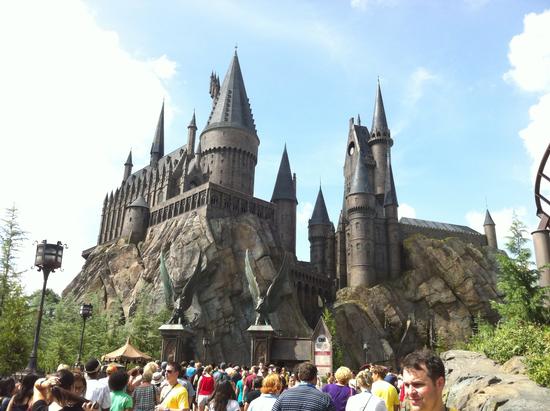
In both of its studio-themed parks, in Hollywood and Orlando, Universal had pretty much stuck to its own, classic film properties. But to develop Islands of Adventure, Universal chose to license multiple properties from other creators, including Marvel Comics' Spider-Man and Incredible Hulk, Jay Ward's Dudley Do-Right, King Features' Popeye and other comic strips, and the Cat in the Hat and other characters from the estate of the late Dr. Seuss. Universal got another boost when Disney decided to drop the proposed Beastly Kingdom land from its Animal Kingdom park, and several designers from that project moved over to Universal, producing a Lost Continent land for Islands of Adventure that looked suspiciously like the planned, and canceled, Beastly Kingdom.
Construction began in 1997 and Islands of Adventure opened officially on May 28, 1999. Unlike its older sibling, Islands of Adventure opened to rave reviews. Fans on the Internet loved Universal's high-tech attractions, most notably The Amazing Adventures of Spider-Man, a hybrid of a motion-base dark ride and 3D projection technology that won the Theme Park Insider Award as the world's best attraction for four straight years before we retired the award, since nothing but Spider-Man ever came close to winning it.
But the new theme park was just one element of the expansion at the resort Universal saddled with the clumsy name "Universal Studios Escape." Universal eliminated its surface parking lot in favor of two massive parking structures, and brought over the CityWalk dining and entertainment mall concept from Universal Studios Hollywood. Add three on-site hotels and Universal had created a model for a modern, walkable, car-less resort destination, one that rival Disney would soon duplicate with its revamp of the Disneyland Resort. (Seriously, the similarities between Disneyland and Universal Orlando these days are uncanny.)
In 2001, Universal wised up and dropped the silly "Escape" name in favor of the far more obvious "Universal Orlando Resort." With a clear marketing focus available at last, backed up by strong word of mouth, Universal Orlando's parks weathered the global drop in tourism in the early 2000s better than other American theme parks, but they still lagged behind all of Disney's parks, even the maligned California Adventure.
Until one more licensing deal propelled Universal to another level.

Both Universal and Disney long had coveted the theme park rights to J.K. Rowling's Harry Potter. But with a Lost Continent land already in place that easily could be reskinned to the village of Hogsmeade, and endorsements from collaborators such as Dr. Seuss's widow, Audrey Stone Dimond (not to mention a rumored fortune in cash through generous royalties), Universal won the rights, creating The Wizarding World of Harry Potter in Islands of Adventure for a June 2010 debut. Wait times to enter the Wizarding World exceed eight hours on its opening day, as the queue of fans extended around the park, then outside it, through CityWalk.
Potter propelled Universal Orlando to double-digit percentage attendance growth in a single year, bringing the company billions of dollars in additional revenue since its opening. Simply, the history of Universal Studios' theme parks should be separated into pre-Potter and post-Potter eras. With millions of new fans and untold profits from Harry Potter, Universal had the funds to buy out long-time partner Blackstone Group, allowing Universal's corporate parent to own 100 percent of the Orlando resort for the first time. Universal's also embarked on an ambitious expansion of its theme parks around the world, building new Harry Potter lands at Universal Studios Florida, Hollywood and Japan.
Back in Orlando, Potter profits have helped Universal build a fourth hotel at the resort, as well as to add and refurbish attractions in both theme parks, helping the Universal Orlando parks draw closer in attendance to those at rival Walt Disney World.
Ironically, Disney now owns one of Islands of Adventure's major licensors, Marvel Comics. But the contract Universal signed with Marvel before Disney bought that company grants Universal Orlando the Florida theme park rights to those characters in perpetuity, preventing Disney from using its own Marvel characters at the Walt Disney World theme parks. Will Disney ever write a check big enough to buy back those rights from Universal? Will Universal use its Potter profits to sign additional license deals, such as landing the theme park rights to Lord of the Rings? Whatever the outcome, the development of Islands of Adventure clearly helped elevate both Universal and the Orlando theme park market to new levels of popularity, with theme park fans being the ultimate winners.
Next: Disney California Adventure
Previously:
So they can update the whole park, but Marvel Super Hero Island just sits there with nothing new forever? Not the best use of that real estate, really, but if it keeps Disney at bay I guess it's a strategy.
Universal can still add, but not subtract without a replacement. For instance, Universal upgraded Spiderman without any adverse affect on their agreement.
I would think it is mostly lack of usage that will cause the rights to revert back to Disney. If Universal wants to continue to maintain the franchise, it should continue to look towards expanding the attractions slate. However, what will happen if they decide to remove Spiderman? Probably nothing because the Hulk roller coaster is still there.
Look at the Marvel movie agreements. Sony continue to reboot Spiderman to maintain a lock on the franchise.
I haven't been able to make the trip to Orlando this year so next year I feel it will be very much all about UO.
Consistent capacity crowds would definitely change the whole vacation experience.. the only saving grace will be early entry.
This article has been archived and is no longer accepting comments.